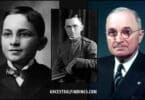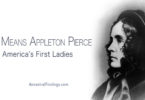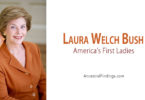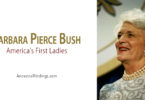The wife of 6th US president John Quincy Adams (himself a son of 2nd US president John Adams), Louisa was also the daughter-in-law of a former US president and First Lady. She married into a well-known political family in America, and once described her mother-in-law, former First Lady Abigail Adams, as the “guiding planet round which we all revolved.” She was also the only First Lady to not be born on American soil, until Melania Trump. Louisa’s is an interesting story of a life lived in a fascinating family. Here are the most important details.
Louisa was born on February 12, 1775, in England to American merchant Joshua Johnson and his English wife, Catherine Nuth. Joshua Johnson was living in England with his wife, conducting his American business, when Louisa was born. Joshua was originally from Maryland, in America.
Louisa had a number of siblings, including six sisters and a brother. Her brother, Thomas, would later serve as the governor of Maryland and as a U.S. Supreme Court justice.
Louisa’s family fled England for France during the American Revolution, out of concern her father’s colonial citizenship would cause English royal suspicion to fall on him as a possible spy. After the Revolution, the family returned to England. They were living near Tower Hill in London in 1790, where her father had been appointed US Consul General to England when John Quincy Adams met her there when he was on business in that nation. John initially showed interest in Louisa’s older sister, but gradually came to appreciate Louisa, and they married on July 26, 1797, in a parish church near Tower Hill in London. Louisa’s parents went back to the United States that same year, but John’s political business in Europe kept him and Louisa on the European continent for several more years. Louisa’s father later died in 1802 and her mother died in 1811.
John and Louisa traveled Europe together for a few years before he brought his new wife home to meet his family in Massachusetts. Having grown up in Europe, Louisa found Massachusetts to be provincial, boring, and a bit primitive, and described the Adams family home in Quincy (which was considered a mansion in the area during that time) as “like something out of Noah’s ark.” Needless to say, she was not impressed with Massachusetts, or America in general.
Louisa and John had four children together between 1801 and 1811, three sons and a daughter. In 1809, Louisa left her two older sons in Massachusetts and went with John to Russia, where he was a Minister for America. Their only daughter, Louisa Catherine Adams, was born and died there, age 1 year, 1 month old. Louisa, never in terrific health, and plagued by migraines and frequent spells of fainting, suffered in the extreme cold of Russia. Being pregnant and having a baby born and later died there did not help her health issues, and, in fact, exacerbated them.
Diplomatic issues sent John to Ghent and then to London in 1814. Louisa joined him in London by making a harrowing forty day coach journey across a Europe that was ravaged by war, where the coach in which she and her son were traveling was set upon by highwaymen and thieves more than once before she reached her husband. The good news for her was that she got to spend a couple of quiet years back in England, where she was comfortable, and knew the customs and language. She enjoyed being back in her country of birth.
When John was appointed as Secretary of State to President James Monroe in 1817, the family returned to the United States, reunited with their other two sons, and moved to Washington, D.C. It was there that Louisa earned her reputation as an excellent hostess, with music and theater parties being frequent social occasions of the D.C. elite in her drawing-room.
She enjoyed this time in her life, but became deeply depressed after John was elected President in 1825. She already suffered from bouts of depression, but it became more pronounced due to the bitter nature of the election. She continued her weekly music and theater parties, but otherwise became more reclusive, preferring to spend her time, and especially her evenings, alone, reading, writing music and lyrics, and playing the harp, at which she was quite skilled.
It was also during John’s tenure as president that she expressed regret at having ever married into the Adams family. She began to feel the men of that family were cold and insensitive, especially after Abigail’s death in 1818. However, she persevered, and continued hosting as was expected of her, and the events were always elegant, while she was always considered a gracious hostess. Even her final hosting event at the White House, after John lost his bid for re-election, was considered a social success.
While her mother-in-law Abigail was known for hanging her laundry in the still-under-construction White House, Louisa is known for raising silkworms there and weaving her own silk from what they produced.
After leaving the White House, Louisa hoped to retire back to Massachusetts, but John began a 17-year career in the US House of Representatives that kept her in D.C. Her two oldest sons died before her, which added to her health and emotional burdens.
John died in D.C. in 1848, and Louisa followed him in 1852, also leaving this life in D.C. instead of Massachusetts. They are both buried together, side by side, next to John’s parents, in the United First Parish Church, in Quincy, Massachusetts. The day of her funeral was the first time the US Congress adjourned in mourning for any woman.
Perhaps Louisa’s role as wife, mother, and First Lady can best be summed up in John’s own words about her. He wrote,
“Our union has not been without its trials. There have been differences of sentiment, of tastes, and of opinions in regard to domestic economy, and to the education of children between us. However, she always has been a faithful and affectionate wife, and a careful, tender, indulgent, and watchful mother to our children.”






